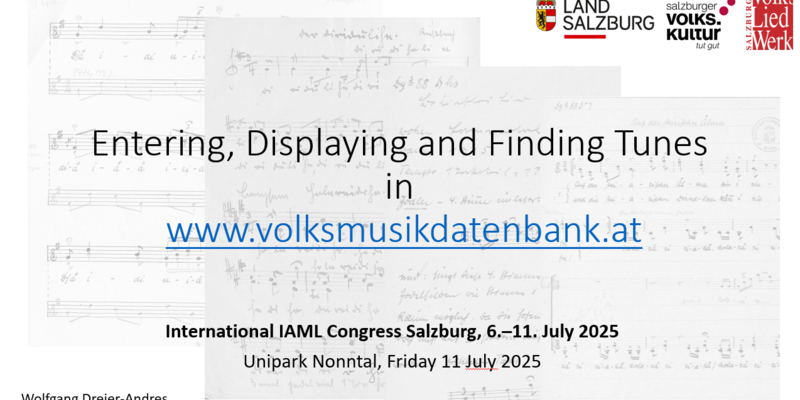Entering, Displaying and Finding Tunes in www.volksmusikdatenbank.at

Das Salzburger und Österreichische Volksliedwerk freuten sich über die Gelegenheit, diese neue, wichtige Funktion der Melodiesuche einem großen, internationalen Fachpublikum präsentieren zu dürfen. Der Vortrag war dem großen Volksmusikforscher und – mittels seines Melodienregisters – Vorreiters der Melodiesuche, Prof. Walter Deutsch (1923–2025) gewidmet. Für alle Interessentinnen und Interessenten wird hier nochmals das Abstract des Vortrags wiedergegeben, Rückfragen gerne direkt an wolfgang.dreier-andres@salzburg.gv.at.
--
The Salzburg and Austrian Folk Song Society were delighted to have the opportunity to present this new, important function of melody search to a large, international audience of experts. The lecture was dedicated to the great folk music researcher and - by means of his melody register - pioneer of the melody search, Prof Walter Deutsch (1923-2025). For all those interested, the abstract of the lecture is reproduced here; please send any queries directly to wolfgang.dreier-andres@salzburg.gv.at.
Abstract:
The Austrian Folk Song Societies put a notable amount of work into making their web-opac www.volksmusikdatenbank.at a search engine not only for lyrics, but also for notes. The lecture will provide some insights into the database and its features, and it will also cover some historical aspects of the cataloguing, which has always been driven by the effort to record not only textual but also musical parameters and to make the extensive holdings searchable in this way. The history of these efforts starts with Karl Magnus Klier's “Entwurf zur Anlage eines Melodien-Registers” and Walter Deutsch's refinement of this draft (1958), presenting models of melody classification in the age of index volumes and card catalogs. Deutsch’s ordinal number, which provides a tonal diatonic pitch class of the first few bars was, as well as the Parsons Code, originally conceived as a register. Since the 1980ies, such codes have been used for databases, allowing to search the datasets for certain patterns. The next step was the digital representation of notes. www.volksmusikdatenbank.at uses abc notation developed by Chris Walshaw, which is a system designed to notate music in plain text format. We use abcjs, the javascript engine by Gregory Dyke and Paul Rosen, to render the musical notation in our song/music datasets, which enables us to provide vector graphics and a midi-output of the notes. Since 2024 we also provide an online keyboard to search for tunes, which we want to introduce in detail.
CV:
Wolfgang Dreier-Andres
(1981) studied Musicology in Salzburg and Newcastle upon Tyne (2004) and got his masters degree from the University of Salzburg in 2005. He subsequently completed his doctorate in 2011 on musical cognition. While undertaking doctoral research, he already worked for the Salzburg Folk Song Society, being head of archives since 2005. His research focuses on various issues of austrian folk music, including, amongst others, its underlying or attributed history(s) and concepts, as well as its instrumentalisation during the Nazi period. Vice President of the Austrian Folk Song Society since 2023.